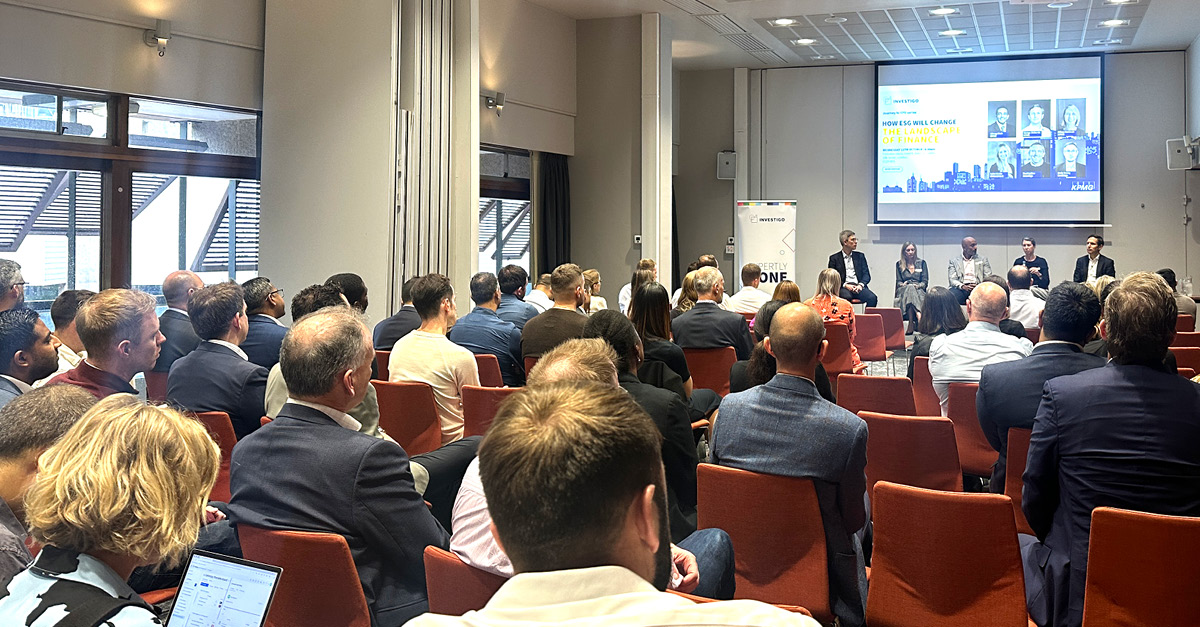
How will ESG change the landscape of finance?
KPMG, Investigo’s accountancy and finance team and industry leaders recently gathered together to explore how ESG will change the finance landscape for organisations of all sizes, while roadmapping the future of sustainability reporting.
At the apt location of the Barbican Centre’s Conservatory Terrace in London, the panel of George Richards, Hilary Eastman and Chirag Shah (KPMG), Kylee Dickie (National Grid) and Andy Young (Investigo) discussed everything from business readiness, reporting, systems and assurance, to the effect of ESG on fundraising. The roundtable was hosted by Investigo’s Paul Collier.
The reporting minefield
ESG information is increasingly in demand. Though a lot is still voluntary, we’re moving to a mandatory environment of reporting under new requirements from the International Sustainability Standards Board (ISSB), the European Financial Reporting Advisory Group (EFRAG), and the US Securities and Exchange Commission (SEC). Investors are also looking to topics beyond climate, such as nature, with recommendations coming from the Taskforce on Nature-related Financial Disclosures (TNFD). With many new requirements coming into force in 2025, organisations have 2024 to get ready.
But how do all these standards work together? When a company has EU subsidiaries, there’s a lot to comply with and there’s overlap between international and EU standards. That’s where standard setters need to make this raft of coexisting guidance and regulations interoperable.
In addition to meeting regulatory requirements, companies need assurance over what they’re reporting – and most FTSE 100 companies are getting some form of external ESG opinion on things like greenhouse gases and environment metrics.
Combining transparency with relevance
The new reporting standards are there to make disclosures more meaningful for both the organisation and the investor. This requires transparency and an understanding of what kind of data is actually relevant and will help the business make the right decisions.
Many organisations are moving beyond CSR and initiatives like volunteering and tree planting, instead wanting to know what a specific environmental issue means to the business. How will it affect the business model? How will it affect resilience? How can you deal with it?
Data is key to enabling ESG
The kind of information you need to assess your environmental impact will be dictated by a number of factors, such as what your competitors are choosing to report and how you’re perceived by ratings agencies.
To give you confidence in your reporting, you need to understand which spectrum of metrics ae most important to the business and will have biggest impact on customers and competitors. Regulation’s about changing your business for the future. That means planning and forecasting around the KPIs you’ve identified.
Invariably, focusing on ESG will bring a new workload that will require new skills, so you’ll need to think about either hiring those skills or finding them inhouse. You’ll also need to adapt your policies and methodologies, and come up with new ones covering materiality.
It’s challenging getting hold of data on how much electricity your building uses, customers’ carbon footprints and the impact of companies you’ve invested in. This means identifying gaps and estimating values. For this, you need the right tools to sort through thousands of data points, and robust validation of that data.
Finance has a big role to play in ESG
Whether it’s your financial or non-financial numbers going to investors, your company will look to the finance team to make sure those numbers are right. They’ll be the ones charged with making sure you have the right frameworks in place for ESG reporting and organisations increasingly have an ESG controller or a team dedicated to ESG reporting.
To improve your internal ESG reporting, you need a strategic business plan with individual business units forecasting financial numbers and key ESG metrics. To do this, you might need a mix of internal and external experts.
New regulatory requirements, research and approaches are coming up all the time, and it can be overwhelming keeping on top of all the developments. To stay at the forefront of this ever-evolving area, organisations need accurate and up to date ESG reporting. At the same time, the ESG space is less mature than the financial space and many organisations are currently doing a lot of their reporting manually. That gives them a business case to implement an ESG reporting platform.
Locating the right talent
In a niche and relatively new sector, where do you find the right people to strengthen your ESG function? Although the two areas are very different, there’s a lot of overlap between finance teams, which are more focused on reporting, and sustainability teams, which are focused on strategy. The rigour of a finance professional provides a good foundation for a role in ESG. You need someone with the passion and proactivity to stay up to date with the ever changing world of ESG, preparing the business for upcoming changes to regulations and policies. On top of that, they need to be adept in stakeholder engagement, able to quickly build a rapport and delegate to other business units.
Many thanks to our speakers and attendees for a thoroughly engaging discussion. We’re always looking to talk to our network about the important issues in the market right now, so if you’d like to organise an event with Investigo, please get in touch.
Find out more about the work our parent company, The IN Group, is doing on ESG.


